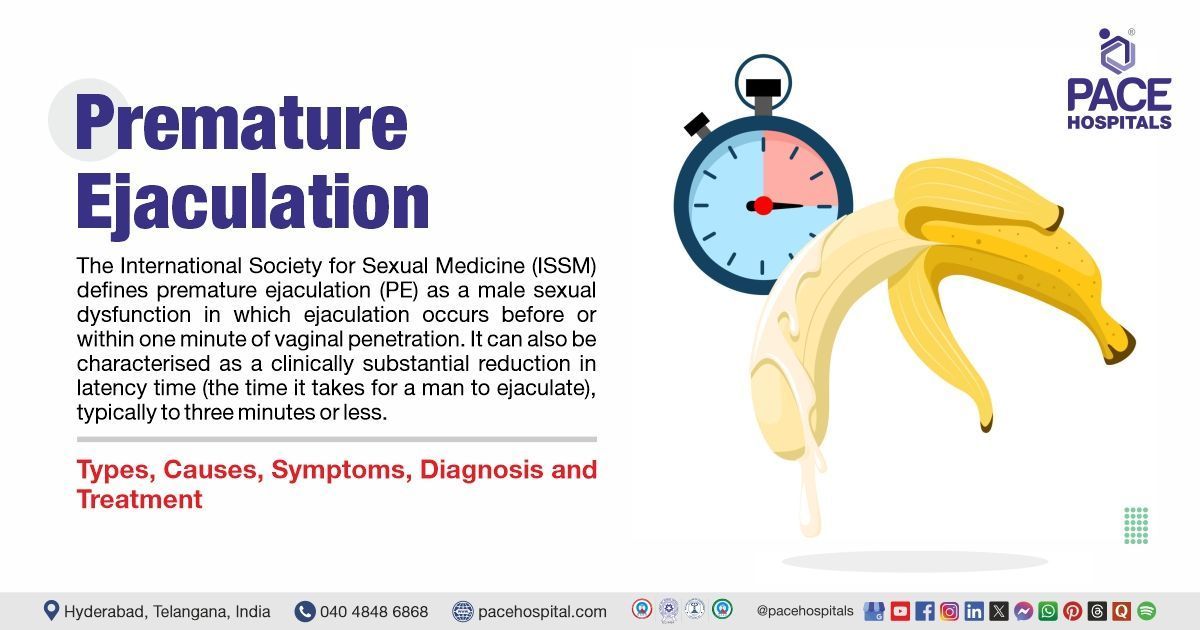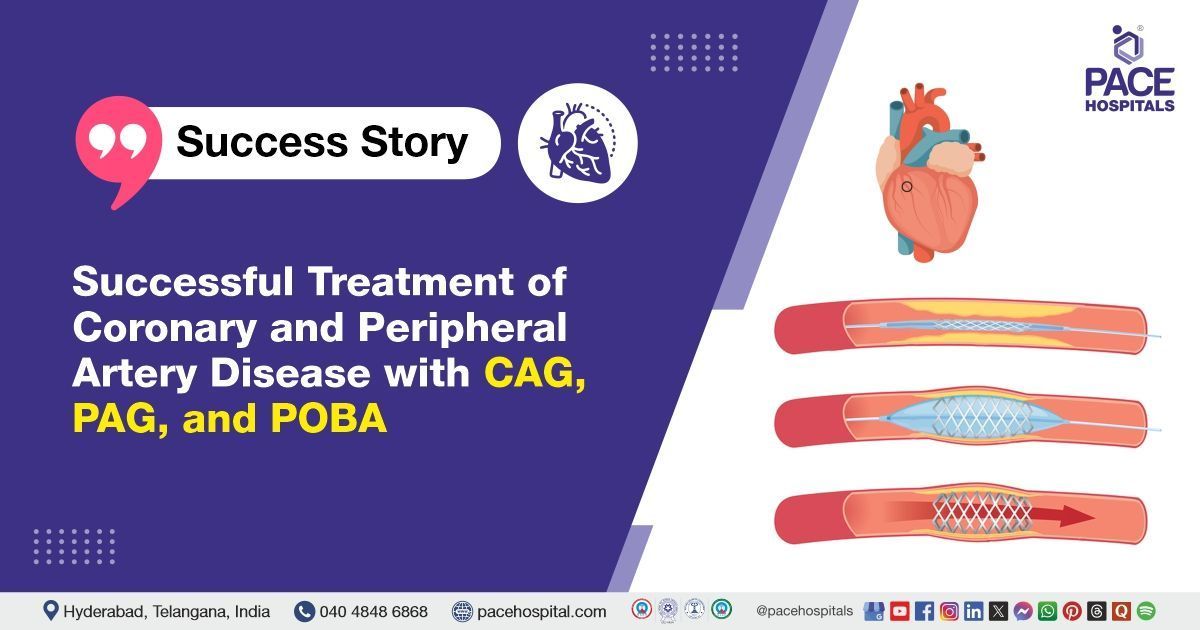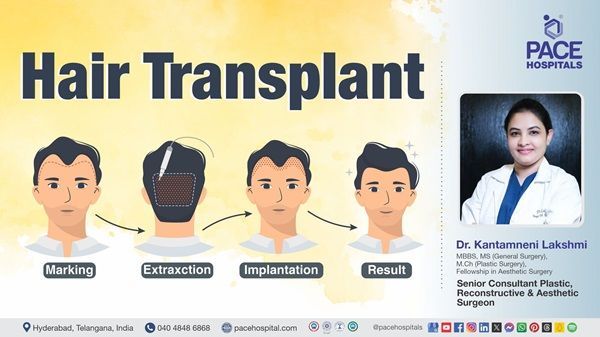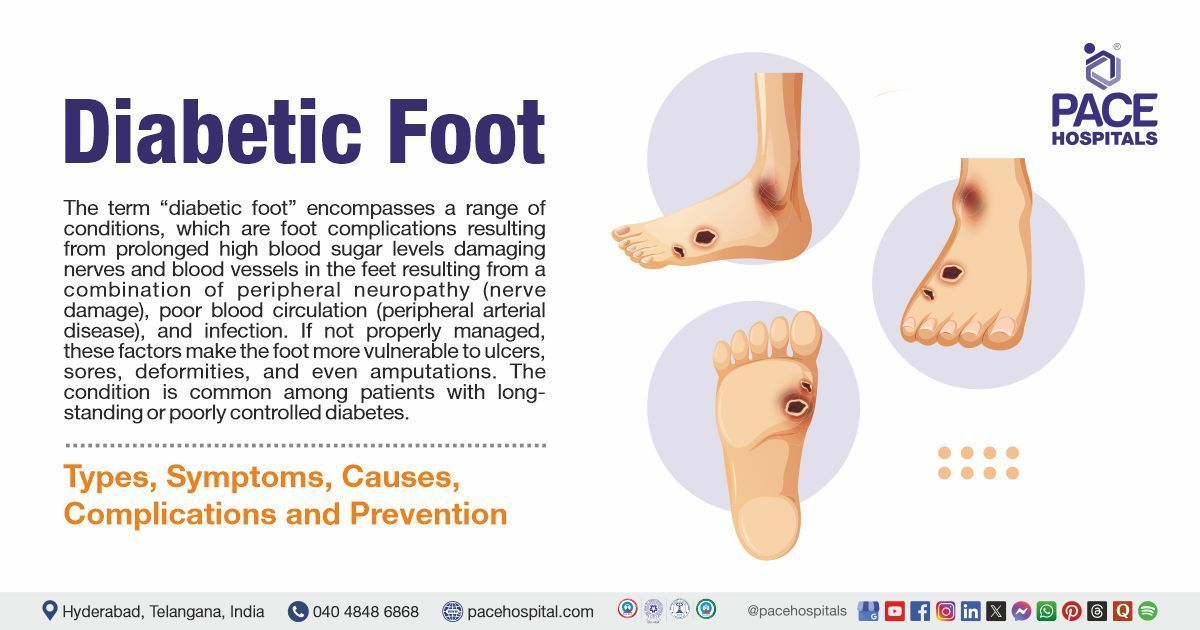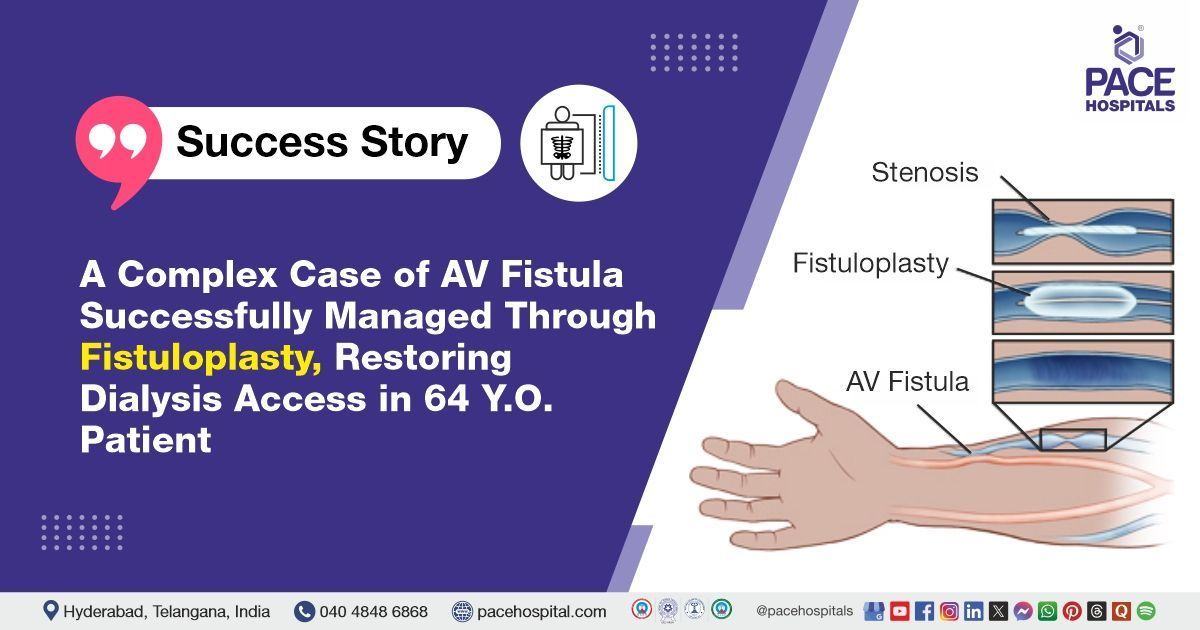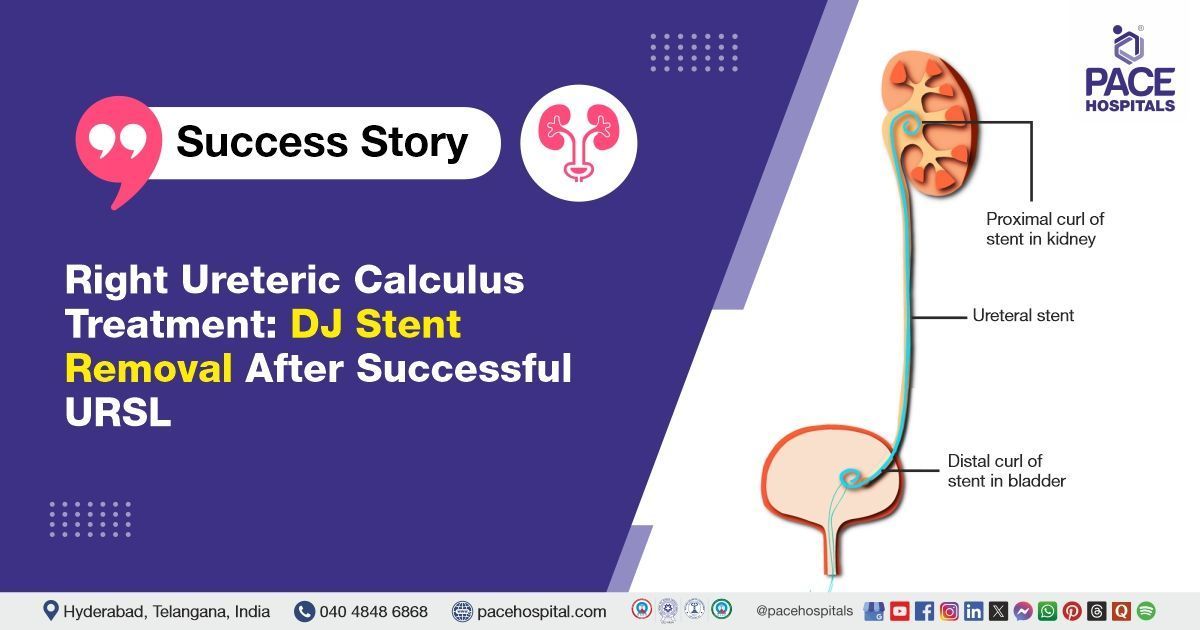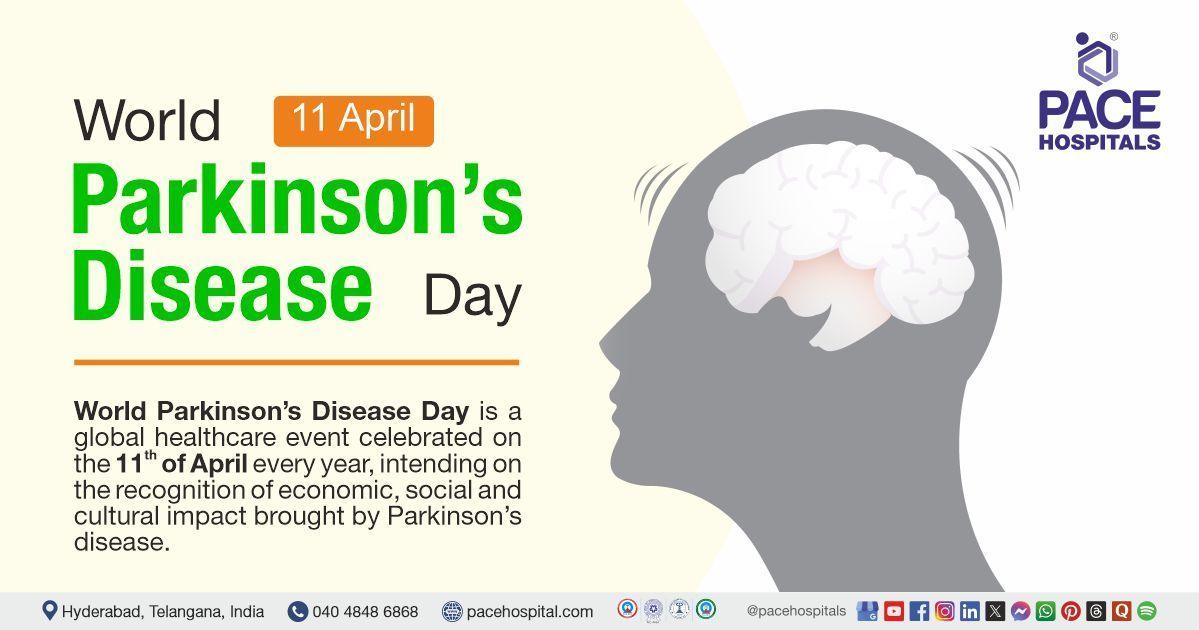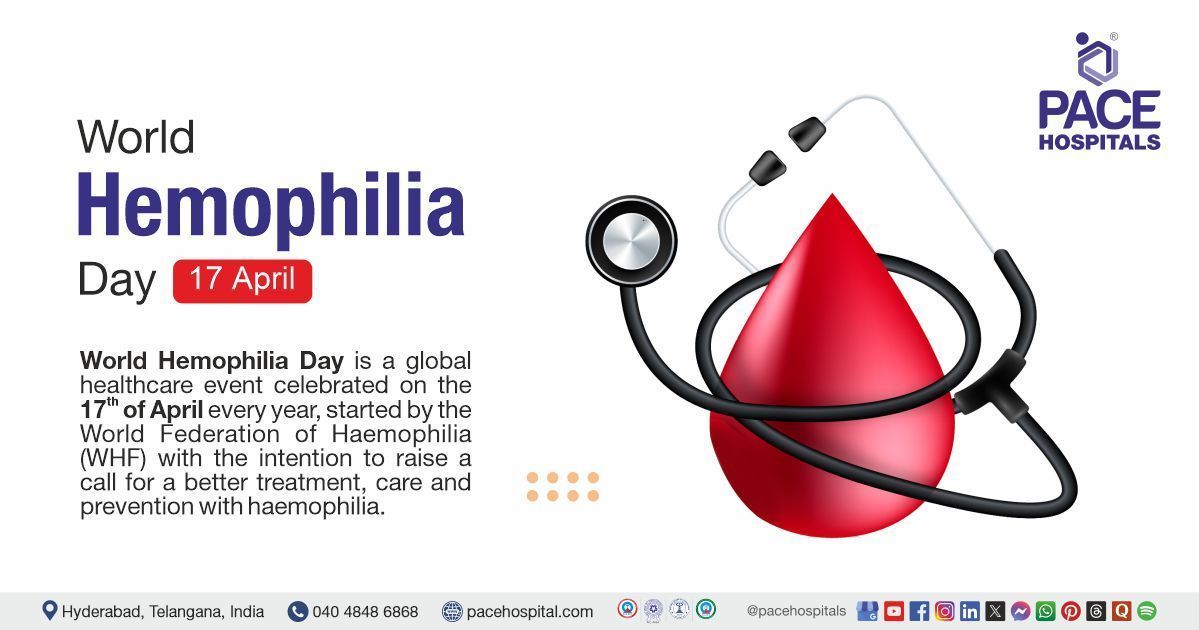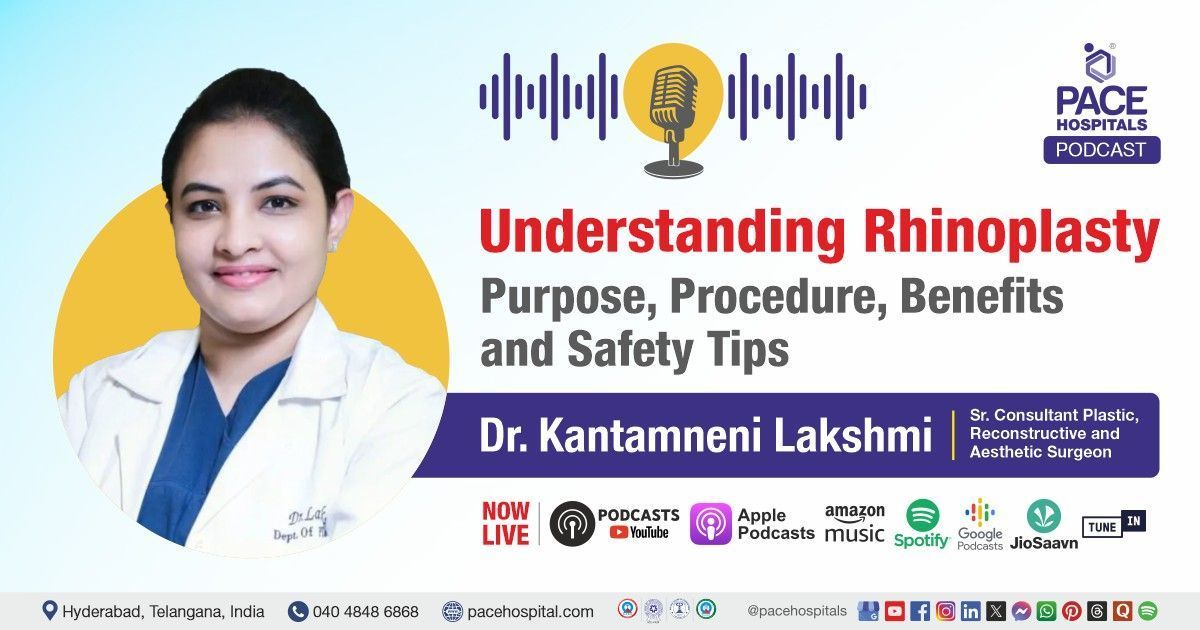Premature Ejaculation: Types, Causes, Symptoms, Diagnosis and Treatment
Premature ejaculation definition
The International Society for Sexual Medicine (ISSM) defines premature ejaculation (PE) as a male sexual dysfunction in which ejaculation occurs before or within one minute of vaginal penetration. It can also be characterised as a clinically substantial reduction in latency time (the time it takes for a man to ejaculate), typically to three minutes or less.
Men who are experience premature ejaculation or other sexual issues may benefit from consulting with a sex therapist, psychologist or urologist.
Premature ejaculation meaning
The term "premature ejaculation" is derived from the Latin phrase “ejaculation praecox”. The word first appeared in medical literature in 1887.
Premature ejaculation statistics
Prevalence of premature ejaculation worldwide
Premature ejaculation is the most commonly encountered sexual dysfunction worldwide. Nearly 30% of adult men aged between 18 to 59 report having problems with premature ejaculation, but some reports put the prevalence as high as 75%. Additionally, 30% of men with premature ejaculation also report experiencing erectile dysfunction, in which case early ejaculation occurs in the absence of a full erection.
Although premature ejaculation can occur at any adult age, it is most frequently reported in the 18 to 30-year-old age group and, together with erectile dysfunction, in the 45 to 65-year-old age group.
Prevalence of premature ejaculation in India
Estimates suggest that approximately 4.6% of men in India report experiencing premature ejaculation as part of a broader spectrum of sexual health disorders. This figure is derived from a study highlighting various sexual dysfunctions among men, where premature ejaculation was one of the less commonly reported issues compared to others like loss of libido and erectile dysfunction.

Premature ejaculation types
Based on the onset, duration, and underlying causes premature ejaculation can be classified into four major types which include:
- Primary or life-long premature ejaculation
- Secondary or acquired premature ejaculation
- Natural variable premature ejaculation
- Subjective premature ejaculation or premature-like ejaculatory dysfunction
Types of Premature Ejaculation
Primary or lifelong premature ejaculation
This kind of premature ejaculation is marked by early and consistent ejaculation and is present from the very first sexual encounter. It is frequently thought to have a significant biological component, including genetic or neurological factors.
Secondary or acquired premature ejaculation
Premature ejaculation of this kind starts later in men’s sexual life. Acquired premature ejaculation (PE) is a male sexual disorder characterized by a clinically substantial and uncomfortable reduction in ejaculation latency time in men with previously normal ejaculatory experiences, generally to approximately 3 minutes or less.
Natural variable premature ejaculation
Men who occasionally experience early ejaculation in specific circumstances but do not consistently have this problem are said to have "natural variable premature ejaculation," which is regarded as a normal variation in ejaculation time rather than a true clinical diagnosis of premature ejaculation.
Subjective premature ejaculation or premature-like ejaculatory dysfunction
Premature-like ejaculatory dysfunction" or "subjective premature ejaculation" refers to a condition in which a man feels an immense amount of distress and believes that his ejaculation is occurring too quickly, even though his ejaculation latency time (the time from penetration to ejaculation) is objectively measured as normal.
What causes premature ejaculation?
The actual cause of premature ejaculation is unknown, although there are numerous reasons why a male may experience early ejaculation. There could be biological, chemical, or emotional factors. Some specific causes that lead to premature ejaculation may include:
Serotonin
Serotonin is a natural chemical produced by the nerves. It helps to regulate how the brain regulates mood, emotion, sleep, and sexual desire. High levels of serotonin in the brain prolong ejaculation. Low levels can decrease the time it takes to ejaculate and cause it to occur prematurely.
Psychological issues
Premature ejaculation may be associated with psychological, or mental health, problems, such as:
- Relationship problems
- Taking care of emotional problems often helps
- Anxiety
- Lack of confidence
- Stress
- Guilt
- Unrealistic expectations about sexual intercourse
- Depression
- History of sexual repression (blocked or bottled-up sexual feelings)
Other issues
Premature ejaculation and age
Men of any age can be affected by premature ejaculation. Early ejaculation is not directly caused by ageing. However, erectile dysfunction may become more prevalent as people age, possibly due to a decrease in serum testosterone levels. Erections may not be as big or firm for some elderly men. The duration of erections may be shorter than before ejaculation occurs. There may be a brief sensation that ejaculation is imminent. An older man may ejaculate early as a result of these changes.
Premature ejaculation and partner
With premature ejaculation, men may feel less connected with their sexual partner. Men might feel angry, ashamed or upset, and turn away from their sexual partner. Premature ejaculation may not only affect men, but it may also affect their partners. Premature ejaculation can cause partners to feel less emotionally connected or hurt.
Discussing the issue is a crucial first step. Counselling or therapy for couples may be beneficial.
The causes and risk factors for premature ejaculation are very similar. However, there is a small distinction between them.
Risk factors are conditions or factors that raise the chance of premature ejaculation but do not directly cause it. These factors make a person more vulnerable, although they do not always cause the disorder. Causes, on the other hand, are the underlying circumstances or conditions that directly lead to the development of premature ejaculation.
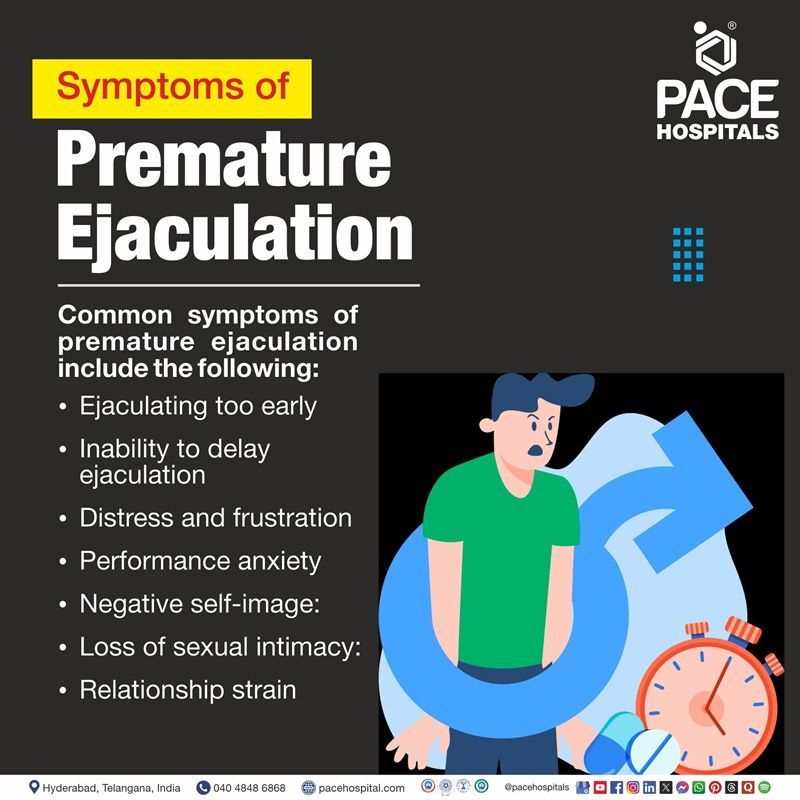
Symptoms of premature ejaculation
Premature ejaculation (PE) is characterized by a number of premature ejaculation symptoms that impair both sexual satisfaction and emotional well-being. Understanding the signs of the disease, from early ejaculation to relationship pressure, is necessary for effective management and treatment. Premature ejaculation symptoms include a range of indicators that can significantly impact an individual's quality of life. Recognizing these premature ejaculation symptoms is crucial for addressing the condition and seeking appropriate treatment.
Common symptoms of premature ejaculation include the following:
- Ejaculating too early: Ejaculating within one to three minutes of penetration, or before penetration
- Inability to delay ejaculation: Being unable to delay ejaculation during sex, even when trying
- Distress and frustration: Feeling distressed or frustrated, which can lead to avoiding sexual intimacy
- Performance anxiety: Fear of ejaculating early, which can make PE worse
- Negative self-image: Developing a negative self-image about sexual performance
- Loss of sexual intimacy: Frequent PE can lead to a loss of intimacy with a partner
- Relationship strain: PE can strain emotional connections within relationships.
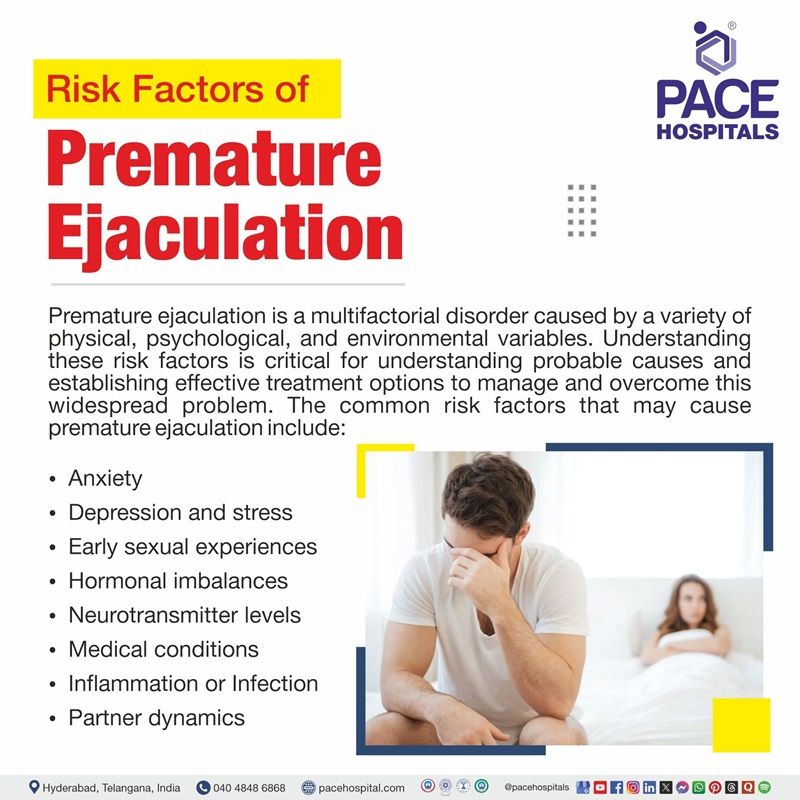
Risk factors of premature ejaculation
Premature ejaculation is a multifactorial disorder caused by a variety of physical, psychological, and environmental factors. Understanding these risk factors is critical for understanding probable causes and establishing effective treatment options to manage and overcome this widespread problem. The common risk factors that may cause premature ejaculation include:
- Anxiety: Anxiety is a major risk factor for premature ejaculation. According to studies, men who are anxious about their sexual performance are more likely to ejaculate prematurely. This anxiety can be caused by a variety of factors, such as a desire to please a partner or a history of negative sexual experiences.
- Depression and stress: Depression and generalised stress are two psychological condition that might lead to premature ejaculation. Emotional tension can impair a man's ability to relax during sexual intercourse, increasing the risk of premature ejaculation.
- Early sexual experiences: Negative early sexual experiences or trauma may cause anxiety and performance concerns in subsequent sexual interactions.
- Hormonal imbalances: Irregular hormone levels, particularly those involving testosterone and serotonin, have been linked to premature ejaculation. Some males with premature ejaculation have elevated testosterone levels, whereas low prolactin levels have also been linked to the illness.
- Neurotransmitter levels: Imbalances in neurotransmitters that control ejaculation can cause premature ejaculation. For example, serotonin is important in regulating ejaculation timing; lower levels may result in early ejaculation.
- Medical conditions: Certain medical conditions, including diabetes, metabolic syndrome, and thyroid disorders, have been linked to an increased risk of premature ejaculation. Men with diabetes have a greater incidence of premature ejaculation, especially when glycaemic management is poor.
- Inflammation or Infection: Prostate or urethral conditions, such as prostatitis, can potentially contribute to premature ejaculation by creating discomfort or interfering with normal ejaculatory function.
- Partner dynamics: Relationship concerns, such as communication breakdowns and varied sexual interests between partners, might increase the risk of premature ejaculation. A man's ejaculatory control may be influenced by his partner's sexual attitude and receptivity.
Complications of premature ejaculation
Premature ejaculation (PE) is a common disorder that can impact a man's sexual health and relationships. While it may initially appear to be a minor issue, its recurrence can develop to wider concerns that require attention and control for general well-being.
The common complications of premature ejaculation include:
- Premature ejaculation might make it harder for couples to conceive if the ejaculation does not occur intravaginal. It can also result in increased tension, worry, and serious relationship troubles.
- Performance anxiety and erectile problems are frequently linked to premature ejaculation.
- In some cases, underlying psychological disorders that contribute to or result from premature ejaculation are not appropriately treated.
- If treatment fails, it may exacerbate emotions of depression and low self-esteem.
Premature ejaculation diagnosis
Many types of important steps are involved in diagnosing premature ejaculation (PE), which is mostly determined by the patient's sexual history and experiences. The diagnostic procedure is broken down as follows:
- Medical and sexual history: Clinicians usually begin by exploring the patient's medical, psychological, and sexual history to provide context and identify potential underlying causes of acquired premature ejaculation. This includes past sexual functioning and relationships to differentiate between acquired and lifelong premature ejaculation.
- Assessment of IELT: An estimate of intravaginal ejaculatory latency time (IELT), the time between vaginal penetration and ejaculation, is taken into consideration.
- Ejaculatory control and distress levels: The degree of ejaculatory control, as well as the distress experienced by the patient and/or partner, should be ascertained.
- Psychological evaluation: A psychological history is important to assess potential psychological causes or associations with PE, including patient stressors and any history or presence of anxiety or depression.
- Physical examination: A focused physical examination, including a genitourinary and neurological assessment of the lower limbs, can help identify underlying causes of premature ejaculation.
- Diagnostic criteria: According to the International Society for Sexual Medicine, the criteria for diagnosing premature ejaculation include:
- Premature ejaculation (PE) occurs when ejaculation happens too quickly, either consistently within about 1 minute of penetration (lifelong PE) or when there’s a noticeable and frustrating decrease in control, often lasting 3 minutes or less (acquired PE). Both types can impact sexual satisfaction and confidence.
- Inability to delay the ejaculation on all or nearly all vaginal penetrations.
- Validated assessment tools: Screening questionnaires like the premature ejaculation diagnostic tool (PEDT) can be used.
Premature ejaculation treatment
Premature ejaculation is often treated using a multimodal strategy that includes behavioural, psychological, and pharmaceutical therapy. In general, pure premature ejaculation does not harm or damage sexual physiology. As such, it is not a sickness, and there is no physiological function to "fix" or surgery to cure the damage because no injury has occurred.
Behavioural therapy
A number of behavioural therapies can help patients become more tolerant and delay ejaculation. Essentially, these therapies help the patient to recognise when ejaculation is about to happen and how to delay it.
Two most frequently recommended behavioural therapies include:
- Start-and-stop technique
- Squeeze method
Pharmacological therapy
In order to address the physiological and psychological components that contribute to PE, pharmacological treatments have become viable options for controlling the condition.
The common drug classes that are used to manage premature ejaculation include:
- Topical anaesthetics
- Selective serotonin reuptake inhibitors (SSRIS)
- Non-selective beta-adrenergic blockers
- Alpha-adrenergic blockers
- Opioid analgesics
- Phosphodiesterase 5 inhibitors (PDE5 inhibitors)
- Tricyclic antidepressants
Psychological therapy
The negative feelings and ideas that might cause issues in sexual relationships can be addressed through psychotherapy. It can boost the patient's sexual confidence and help them feel less nervous about having an intercourse. In individuals with perceived premature ejaculation or underlying psychological issues (when the intravaginal latency time is actually normal), it is the recommended first-line treatment.
Current psychotherapy for premature ejaculation is short-term and combines behavioural, cognitive, systems, and psychodynamic techniques. The goal is to assist the patient learn to control ejaculation and alleviate the negative psychological impacts and feelings it generates.
Combination therapy
Combination therapy with SSRI drugs, ejaculatory delay techniques, local desensitisation procedures, psychological support, and behavioural (sex) therapy has proven to be the most effective treatment for premature ejaculation.
This is because every aspect of the problem are addressed, including the underlying psychological, interpersonal, cognitive, and relationship issues that caused and supported the condition.
Non-pharmacological treatment of premature ejaculation (treatment without medications)
- Meditation/relaxation, hypnotherapy: These methods can help improve ejaculatory control.
- Precoital masturbation: This is another non-pharmacological treatment.
- Extended foreplay: This can be a helpful strategy.
- Cognitive distraction: Cognitive distraction might be useful.
- Alternate sex positions: Trying different positions may offer some benefit.
- Interval sex: This involves taking breaks during sexual activity.
- Increasing frequency of sex: More frequent sexual activity may help.
Emerging treatments for premature ejaculation
- Dorsal penile nerve cryoablation
- Neuromodulation
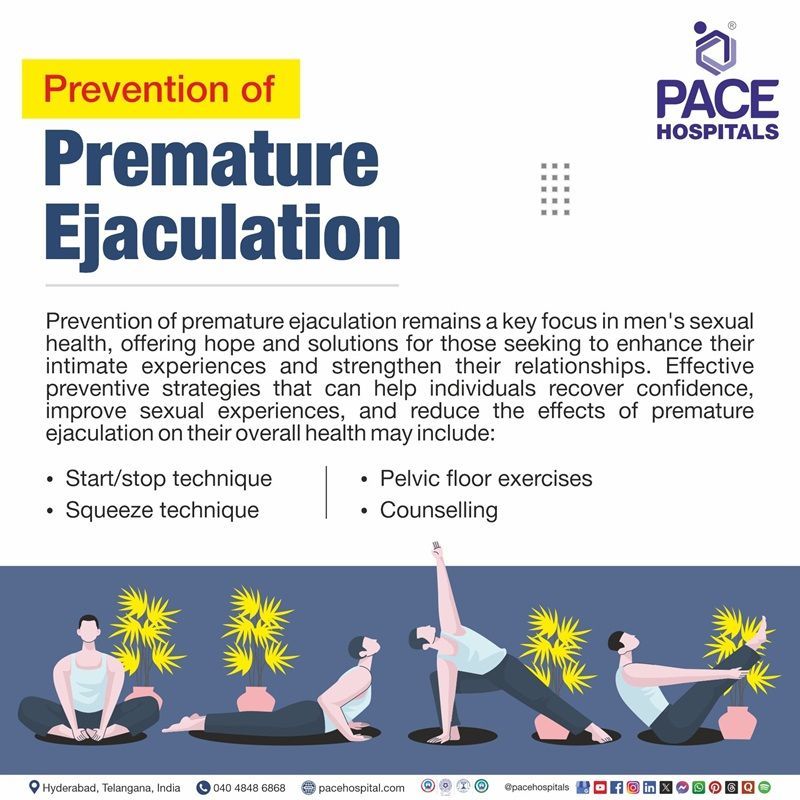
How to prevent premature ejaculation?
Premature ejaculation is a multifactorial disorder caused by a variety of physical, psychological, and environmental variables. Understanding these risk factors is critical for identifying probable causes and establishing effective treatment options, including a potential premature ejaculation cure, to manage and overcome this widespread problem. The common risk factors that may contribute to premature ejaculation include:
Start/stop technique: This technique entails the couple stopping sexual activity prior to ejaculation and then resuming after a short break. Although there may be short-term advantages to this method, research suggests that long-term control might not be maintained.
Squeeze technique: Similar to the start/stop approach, this technique involves applying pressure to the penis to postpone ejaculation. Studies indicate different success rates, with only about 64% of patients retaining ejaculatory control over time.
Pelvic floor exercises: Ejaculatory control can be improved by strengthening the pelvic floor muscles. These exercises increase awareness and control during sexual activity by recognising and exercising the muscles utilised to stop urine.
Counselling : Counselling can also be useful for addressing psychological issues like relationship problems or anxiety. This method aids patients in controlling the emotional reactions that lead to early ejaculation.
Difference between erectile dysfunction and premature ejaculation
Erectile dysfunction vs Premature ejaculation
Premature ejaculation and erectile dysfunction are two separate sexual health issues that have different effects on men. Although both can affect confidence and sexual performance, it's critical to distinguish between the two because they have different causes, symptoms, and treatment modalities.
The table below depicts the common differences between erectile dysfunction and premature ejaculation
| Aspect | Erectile dysfunction | Premature ejaculation |
|---|---|---|
| Definition | Inability to achieve or maintain an erection sufficient for sexual activity. | Inability to delay ejaculation during sexual activity. |
| Onset | Occurs when an erection cannot be maintained during sexual activity. | Often occurs immediately or shortly after penetration. |
| Causes | Physical factors (vascular, neurological issues) or psychological factors. | Psychological factors, hypersensitivity, hormonal imbalance. |
| Duration of Symptoms | Erection failure can occur at any point during sexual activity. | Short duration of ejaculation, often within minutes. |
| Impact on Sexual Experience | Affects ability to engage in sexual intercourse altogether. | Affects climax control and satisfaction for both partners. |
| Treatment | Typically treated with medications (PDE5 inhibitors), lifestyle changes, or therapy. | Often treated with behavioral therapy or medication (SSRIs, topical anesthetics). |
Frequently Asked Questions (FAQs) on Premature ejaculation
How to overcome premature ejaculation?
To overcome premature ejaculation, using behavioural strategies such as the start-stop and squeeze methods, as well as pelvic floor exercises may ease the condition. Counselling or medical interventions such as topical anaesthetics or medicines are the other options that help to manage premature ejaculation. Consultation with a urologist for tailored guidance and assistance is highly recommended.
Does smoking cause premature ejaculation?
Smoking affects blood flow and nitric oxide levels, which can lead to erectile dysfunction and premature ejaculation. Contrary to widespread belief, smoking does not make men to increase ejaculation time. Nevertheless, quitting improves circulation and sexual function.
Is premature ejaculation permanent?
No. While premature ejaculation can be a chronic problem for some men, particularly those with lifetime premature ejaculation, it is not considered permanent. Many people can make considerable improvements with adequate medical care and behavioural techniques. Addressing the underlying causes of acquired premature ejaculation can typically result in a better prognosis. Consultation with a healthcare expert is recommended for specific treatment choices.
Can lifestyle changes help manage premature ejaculation?
Yes, lifestyle changes such as regular exercise, stress management techniques (meditation, yoga), a healthy diet, and avoiding excessive alcohol and drugs can significantly help manage premature ejaculation by improving overall physical and mental health, which positively impacts sexual performance. Open communication with the partner is also essential.
Are there any risks associated with untreated premature ejaculation?
Yes, untreated premature ejaculation can cause significant psychological distress, including increased anxiety, low self-esteem, relationship problems, depression, and feelings of shame or guilt due to the inability to satisfy a partner, potentially affecting overall quality of life and sexual satisfaction.
Will SSRI cause premature ejaculations?
No. while SSRIs can effectively treat premature ejaculation by increasing the time to ejaculation and boosting sexual satisfaction, they may also create negative effects that prompt some people to discontinue the therapy. Patients are recommended to discuss these potential effects and advantages with their concerned
urologist when considering SSRIs for premature ejaculation therapy.
Will semen retention cure premature ejaculation?
No, there is currently insufficient scientific evidence to suggest that semen retention (not ejaculating on purpose) can cure premature ejaculation; most medical experts do not recommend it as a primary treatment method for premature ejaculation, and instead better-proven options such as behavioural therapy or medications should be consulted with a healthcare expert.
Who to consult for erectile dysfunction and premature ejaculation?
A urologist or a mental health care experts who specialises in sexual issues can cure premature ejaculation. Urologists are frequently recommended since they have a deeper understanding of the male reproductive system and the difficulties that can arise.
Does peyronie's disease cause premature ejaculation?
Yes, Peyronie's disease can cause premature ejaculation. Peyronie's disease is a condition in which scar tissue forms, making it difficult to achieve or sustain an erection. This can lead to tension and anxiety which can result in secondary sexual dysfunctions such as premature ejaculation.
Can meditation cure premature ejaculation?
There is currently little evidence in the research studies to support the use of yoga to treat premature ejaculation. Nonetheless, a few investigations have documented encouraging outcomes linked to yoga practices, including a notable improvement in the intravaginal ejaculatory latency period, an increase in the mean intravaginal ejaculation time, and an extended duration of the sexual act.
Yes, an enlarged prostate, especially when associated with inflammation (prostatitis), can potentially contribute to premature ejaculation, though the exact mechanism is complex and poorly understood; research suggests a link between chronic prostatitis and an increased risk of premature ejaculation in some men.
Yes, premature ejaculation is considered a highly prevalent condition among men, affecting between one in three and one in five men aged 18 to 59 years, making it the most frequently reported sexual dysfunction in males; many men experience it at some point in their lives, but not necessarily as a continuous problem.
Request an appointment
Fill in the appointment form or call us instantly to book a confirmed appointment with our super specialist at 04048486868
Appointment request - health articles
Thank you for contacting us. We will get back to you as soon as possible. Kindly save these contact details in your contacts to receive calls and messages:-
Appointment Desk: 04048486868
Whatsapp: 8977889778
Regards,
Pace Hospitals
Hitech City and Madinaguda
Hyderabad, Telangana, India.
Oops, there was an error sending your message. Please try again later. We will get back to you as soon as possible. Kindly save these contact details in your contacts to receive calls and messages:-
Appointment Desk: 04048486868
Whatsapp: 8977889778
Regards,
Pace Hospitals
Hitech City and Madinaguda
Hyderabad, Telangana, India.
Our Locations – Find the Best Hospital Near You
Metro Pillar Number C1772, Beside Avasa Hotel, Hitech City Road, Near HITEC City Metro Station, Hyderabad, Telangana, India.
Mythri Nagar, Beside South India Shopping Mall, Hafeezpet, Madeenaguda, Hyderabad, Telangana, India.
040 4848 6868
Payment in advance for treatment at PACE Hospitals, Hyderabad, Telangana, India (Pay in INR ₹)
For Bank Transfer:-
- Bank Name: HDFC
Company Name: Pace Hospitals
A/c No.50200028705218
IFSC Code: HDFC0000545 - Bank Name: STATE BANK OF INDIA
Company Name: Pace Hospitals
A/c No.62206858997
IFSC Code: SBIN0020299
Scan QR Code by Any Payment App (GPay, Paytm, Phonepe, BHIM, Bank Apps, Amazon, Airtel, Truecaller, Idea, Whatsapp etc).

CONTACT US
Call: +914048486868
WhatsApp: +918977889778
Email: info@pacehospitals.in
FOLLOW US
SUBSCRIBE
Subscribe to our newsletter and stay updated with the latest health information.
Subscribe to PACE Hospitals' Public Newsletter
Thank you for subscribing to PACE Hospitals' Newsletter. Stay updated with the latest health information.
Oops, there was an error. Please try again submitting your details.
ABOUT US
QUICK LINKS
Disclaimer
General information on healthcare issues is made available by PACE Hospitals through this website (www.pacehospital.com), as well as its other websites and branded social media pages. The text, videos, illustrations, photographs, quoted information, and other materials found on these websites (here by collectively referred to as "Content") are offered for informational purposes only and is neither exhaustive nor complete. Prior to forming a decision in regard to your health, consult your doctor or any another healthcare professional. PACE Hospitals does not have an obligation to update or modify the "Content" or to explain or resolve any inconsistencies therein.
The "Content" from the website of PACE Hospitals or from its branded social media pages might include any adult explicit "Content" which is deemed exclusively medical or health-related and not otherwise. Publishing material or making references to specific sources, such as to any particular therapies, goods, drugs, practises, doctors, nurses, other healthcare professionals, diagnoses or procedures is done purely for informational purposes and does not reflect any endorsement by PACE Hospitals – your trusted hospital near me.

